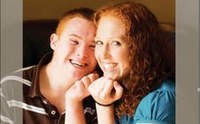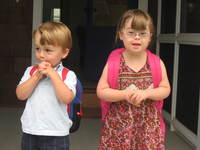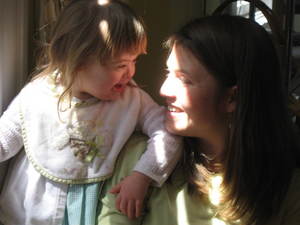Jenni Newbury writes about life with a younger brother with Down syndrome.
I don’t remember life before Jason was born. I imagine I
enjoyed my two years as an only child, but I simply have no recollection of
life without him. The memories I do have include:pulling Jason across our tile
floor to hear him giggle, sitting together on the couch as we went on an
imaginary trip with my dolls, and running alongside him the very first time he
rode a two-wheel bicycle. There are other memories as well: visiting doctor’s
offices, watching therapists come in and out of our house, and constantly
translating Jason’s developing speech to others. The memories meld together,
not one more specific than another, not one less “normal” than another.
The first time I remember defining Down Syndrome was when my
parents and I gave a presentation to Jason’s fourth grade class. We knew his
peers were asking questions and felt if we could explain some details, they
would be more accepting as they got older. They were, at times – but not
always. As a big sister I defended my brother when others took advantage of him
or teased him. Many times Jason didn’t even notice, but I felt it was my
responsibility to guard his dignity.
As we grew up, I worked to create new ways for Jason to be
included. In high school I created a club that hosted social opportunities for
students with and without disabilities. I co-founded Camp PALS, a weeklong
sleep away camp for young adults with Down Syndrome. In college, I founded
Princeton Disability Awareness and hosted an annual Down Syndrome Conference
for children with Down Syndrome, their siblings and families. Through each of
these programs, I worked to bring others into the world where I lived, and
provide them with the experience of knowing someone with Down Syndrome.
For many who have never met someone with Down Syndrome, it
might be difficult to imagine how much can be gained from someone with a
disability, someone who–by society’s standards–is lacking. People with Down
Syndrome are burdened by many stereotypes–most degrading, if not
offensive. None of them come to
mind when I think Jason. Through Jason, I have learned what it means to be
strong, courageous, sincere, and honest. Jason has shown me how to forgive others,
how to experience joy in the smallest of moments, and how to love radically.
After graduating Princeton, I found a new home working for
Special Olympics. Their mission challenges and inspires me every day, but the
real honor is working for an organization that has directly enhanced Jason’s
life. Beyond sport, which has provided Jason with many opportunities, Special
Olympics has taught him about advocacy.
Over the past two years, Jason has developed a new hero–his
name is Tim Shriver. Although not completely lacking in superhuman powers, Tim
became Jason’s hero for a simple reason: he gave Jason a voice. When Jason
spoke, Tim listened. When Jason attended a meeting, Tim asked for his insight.
When Jason was by himself, Tim joined him. Through this simple acceptance,
these acts of inclusion, and this demonstration that he valued Jason, Tim
transformed Jason’s world and empowered him to begin reaching his full
potential. Tim represents only a small example of the power that a movement
like Special Olympics brings with it. A power that, to no one’s surprise, started
with the passion and determination of a sibling.
So why does this matter? As a sibling of someone with Down
Syndrome, the question I am asked most often is the following: Would you change
it if you could? If you could separate Jason from his diagnosis of Down
Syndrome, would you take away the disability?
Looking back, I consider the many ways I’ve worked to make
Jason included, to have people see his value. The common theme is that I’ve
never once considered changing Jason. I try to give others new experiences,
transform people’s misconceptions and re-direct their expectations. Like a
recent Special Olympics advertisement I read, my goal has been to make others
rethink, to consider “truth without judgment, love without boundaries, respect
without requirements.” If I am eliminating a disability, the disability is not
in Jason–it’s in the world.
So what is it like to have a sibling with Down Syndrome? It
is an honor. Jason’s life is nothing short of a gift, and his presence in mine
is one of God’s greatest blessings.
Jenni Newbury currently resides in Washington, DC where she works for Special Olympics Project UNIFY as the Curriculum and Education Resource Manager. Most of her free time is spent working on the growth and expansion of Camp PALS. Since Jenni graduated from Princeton and left home in New Jersey, she and Jason have been adjusting to the new distance between them – but she is hoping to eventually convince Jason to move down to DC.


